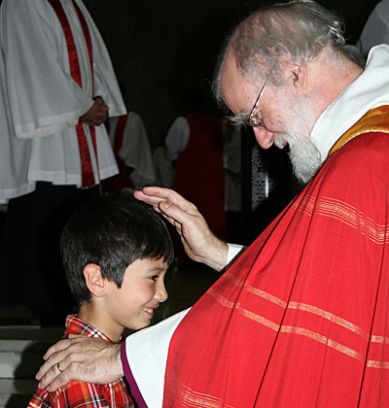Church Leaders Celebrate 150th Anniversary of Japanese Anglican Church

Major denominational leaders convened in Japan this week for the 150th anniversary celebration of the Anglican church of Japan, or the Nippon Sei Ko Kai (NSKK).
Archbishop of Canterbury Rowan Williams and Presiding Bishop of the Episcopal Church Katharine Jefferts Schori were among the hundreds of international guests invited to the week of events, which included services, lectures, conferences and concerts held at various venues across the country.
"We're here tonight to give thanks to God for 150 years of an Anglican presence in Japan," said Jefferts Schori at an Evening Prayer service held in Rikkyo University on Tuesday. "We are here as well to give thanks for the earliest province of the Anglican Communion which had not been part of the British Empire. I will begin by acknowledging, however, that the Nippon Sei Ko Kai owes its roots to American imperialism instead. Commodore Perry's insistence on a trade agreement in 1853-4 was soon followed by the entry of American missionaries who had been serving in China. God continues to work good out of things which did not begin in peace and holiness."
Schori continued by outlining that the challenge to the NSKK today is the same as, "that of the last 150 years – how to be faithful, poor in spirit, and righteous in a culture that doesn't always share those values."
"Your ability to transform the society around you toward that vision of the heavenly kingdom lies in your ability to speak to this context…[t]his indigenizing church needs to speak good news in pachinko parlors, in anime, in the anonymity of crowded cities," said the bishop. "This church has the ability to do that in this generation, as it has in generations past."
Along with attending the week's events, Jefferts Schori also took time to meet with the National Council of Churches in Japan, who she was surprised to find were very well versed in knowledge about American government policy.
"The questions they asked were provocative," Schori told the Episcopal News Service (ENS). "It is abundantly clear that not only leaders here, but the average citizen, know a great deal more about United States government policy than most Americans. They were most interested in how [the Obama] administration has changed in its relationships with the faith community."
Regarding the challenges NSKK faces as a church body, Schori said that they are similar to those of the U.S. Episcopal Church, according to ENS, with issues including, "an aging population, difficulty in evangelizing to a largely non-Christian population, as well as the changing demographics of the nation."
"Racism and xenophobia are significant issues in Japanese culture as they are in the U.S.," she continued, "and the NSKK has been a leader in seeking to change attitudes as well as legal realities."
The head of the Anglican church, Archbishop Rowan Williams, was also on hand for week's activities, participating in the events as a part of his provincial visit to Japan.
On Monday, the Anglican head received an Honorary Doctorate Degree in Humanities from Rikkyo University, where he delivered a lecture stating that, "education based only on reason is incomplete."
"'Faith-based' education is education in the mixture of realism or provisionality with the courage to act, discover and create, to make relations and mend them," Williams said.
"A Christian institution is not necessarily one where everyone is drawn into the same patterns of moral life or discipline, but it is one where people are constantly being exposed to the challenge of living in such a way that justice and mercy and mutuality become visible," he added.
On Wednesday, the archbishop preached to over 2000 people at the Roman Catholic Cathedral of St. Mary in Tokyo for the NSKK 150th Anniversary Eucharist in Tokyo, encouraging the church to make 'simplicity' a priority in mission strategy.
"[A]fter one hundred and fifty years of Anglican presence in Japan, we are asked today, as we give joyful thanks for this heritage, to think about how we now approach this nation, this society, with the good news," Williams said. "Simplicity comes first ... Risk and solidarity come next ... And reverence comes third. If we can continue in this 'barefoot' mission, we shall be opening ourselves up to the simplicity of Jesus himself and so to the transforming grace and beauty of his own mission.
"God has blessed Christians in Japan, not least Anglican Christians, with great courage, great endurance and great willingness to 'walk lightly,'" he continued. "May God walk with us and speak through us as we seek to present to his beloved children in this country the possibilities of freedom and peace and hope, of meaningful and reconciled life, which the Good News of Jesus Christ offers to all."
Williams is scheduled to be present at two more services during the week's events, including the 125th Anniversary Celebrations of Momoyama Gakuin (St Andrew's) Educational Institutions in Osaka, before returning to London on Sunday.